Living with a New Identity - The Question of Gender: Aya Kamikawa, Dialogue with Gender Minorities
Purwoko Adhi Nugroho
Assistant Program Officer
Japanese Studies & Intellectual Exchange Section
The Japan Foundation, Jakarta
On April 30, 2013, the Japan Foundation, Jakarta held the 3rd Discussion Forum under the theme of "Living with a New Identity - The Question of Gender" with Aya Kamikawa as a guest speaker.
It was the third of a set of events with 5 discussion forums, "In Search for Identity: Series of Discussion Forums Inspired by Indonesian Literature", and co-hosted by the Lontar Foundation. The 3rd forum was held to provide the opportunity for those who would like to raise and discuss the sensational issues on challenges that the society in Indonesia is now facing, and to share the constructive views.
For the 3rd Discussion Forums in April 30, 2013, we chose the topic of transgender and titled the event, "Living with a New Identity - The Question of Gender". Why gender? It was because gender is considered as the basis of characterizing the personality and defining how the people deal with the society. The third gender or the marginalized gender, or LGBT are not exceptional.
We started the discussion with questions such as "Have you ever felt uncomfortable with your own gender?", "Have you ever thought about the reason why we draw a long hair and a skirt for a girl and short hairstyle and the shorts for a boy?", "What happened when you felt uncomfortable that you did not fit in those pictures?" Our enlightening and thought-provoking discussion started with the trigger questions.
Ms. Aya Kamikawa, our guest speaker from Japan, is a well-known politician in Japan and a member of Setagaya ward assembly in Tokyo, the most populous district. She was the first transgender candidate running for the election in Japan and won an assembly seat. Panelists from Indonesia were firstly, Ms. Merlyn Sofjan, the author of autobiographical novels: Don't Look at (Only) My Genitalia and A Woman without V. She won the title of "Miss Transsexual Indonesia 2006" and won the third place for "Saparinah Sadli Award 2012." Secondly, Ms. Luluk Surahman, the LGBT (Lesbian, Gay, Bisexual and Transgender) and Human Rights Officer of United Nations Development Programme (UNDP) Indonesia. And thirdly, Ms. Ibu Halimah, the mother of Mizz Ajeng (born: Raden Maulana), an upcoming multitalented singer.
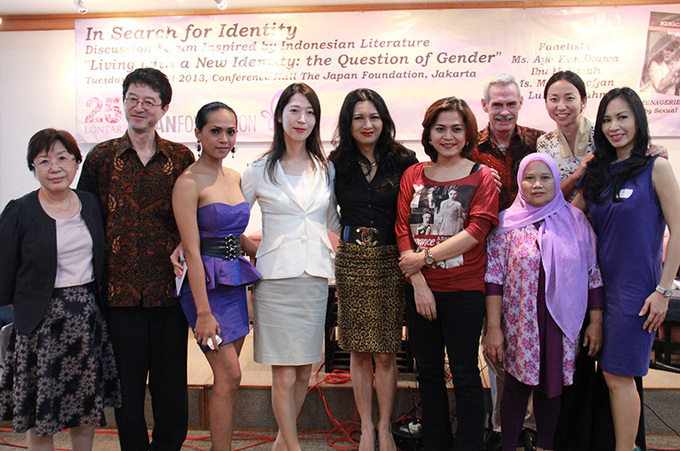
Jakarta, April 30, 2013: Panelists of the 3rd Series of Discussion Forums Inspired by Indonesian Literature, "Living with a New Identity - The Question of Gender". Mizz Ajeng (third from the left), Aya Kamikawa (fourth from the left), Merlyn Sofjan (fifth from the left), Luluk Surahman (sixth from the left), and Ibu Halimah (seventh from the left).
In the Discussion: Warm Support from Family
During the discussion, Kamikawa shared, "I decided not to pretend to be an ordinary male anymore, but try to be who I truly am. I changed my gender, the reason was because I knew that I was different and I could feel that between my body and heart there was no harmony. But it wasn't easy at all, it is thanks to my father who encouraged me by telling me to do whatever I think is right."
As a politician, she devotes herself to work for improving the rights of women, children, the elderly and disabled people as well as the LGBT. From her experiences we can learn that we, each citizen, need to be courageous enough to stand up and make our voice heard for minorities. If we do so, then eventually we could change the society for the better, as Kamikawa and her supporters have done so.
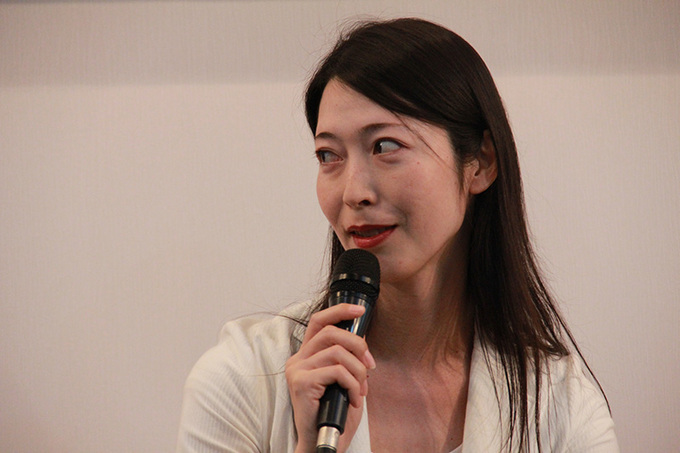
Jakarta, April 30, 2013: Aya Kamikawa is sharing her stories at The Japan Foundation, Jakarta.
Merlyn said that the most precious moment of her life was not when she won the title of "Miss Transsexual Indonesia" or when she had her books published, but it was when her father talked to her on the phone and said how proud he was to have her as his daughter (not as his son anymore). The discussion was also enriched by a side story from an honest mother who accepted her beloved child's gender issue in despite of any norms and criticism from society. She, Halimah, takes the exact opposite position to the Islamic fundamentalists, though she is a traditional and conservative mother raised by a humble Muslim family. "It is a destiny from God the Almighty that every child is born with advantages and disadvantages", said Ibu Halimah. "It is a mother's duty to warmly accepts and supports her children whatever the conditions, even if there were sadness and anger in the beginning."
Admiring Kamikawa's Straightforwardness
What we found interesting about Aya Kamikawa's visit to Indonesia was the way Indonesian public reacted. As mentioned earlier, in the beginning we were very much concerned the reaction from the public on her visit to Indonesia and the event. She was warmly accepted by the public, to our surprise, and the audience enjoyed not only thought-provoking but also a constructive discussion. One of the participants suddenly rose from the seat in the middle of the discussion, and praised Kamikawa's courage to accept herself just as the way she was and also to take the political role in listening and carrying the voice from minorities, not limited to the sexual minorities, to be listened by the government.
The same situation also happened on the next day when Kamikawa gave a public lecture to the university students at the Graduate School of Japanese Studies, the University of Indonesia. One of the students said, "Listening to your stories of fighting for the equal rights for the minorities made me think the importance of the minorities to have governmental and political representatives. I hope that eventually Indonesia will have minority representatives inside the government, in order to have a better democracy and thus better Indonesia."
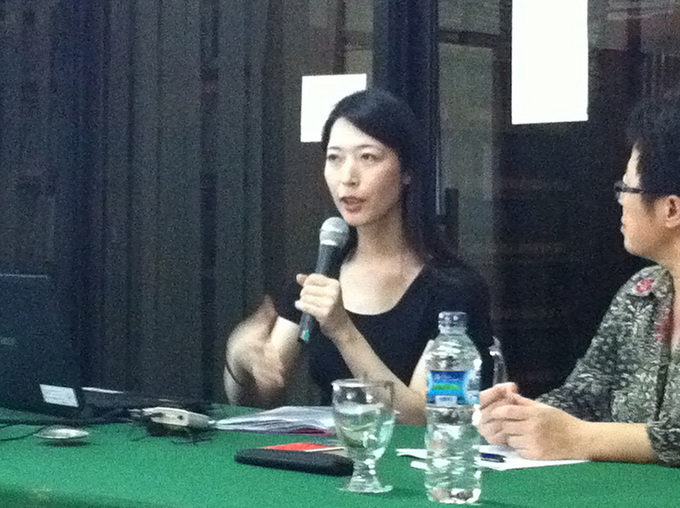
Jakarta, May 1, 2013: Aya Kamikawa gave a public lecture at the Graduate School of Japanese Studies, University of Indonesia.
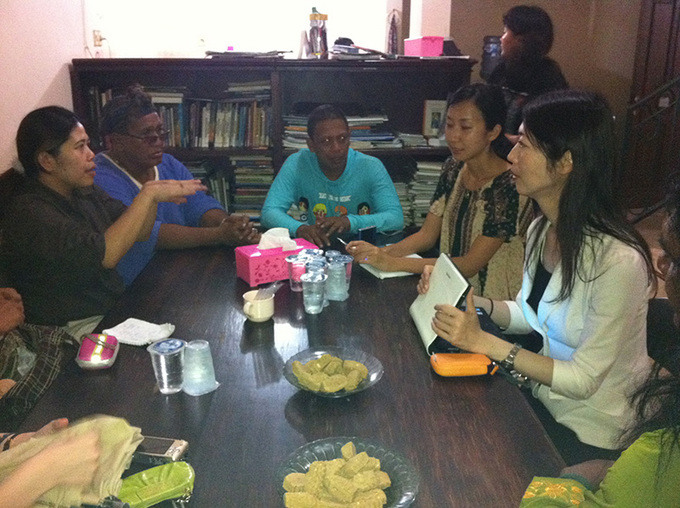
Jakarta, May 1, 2013: Aya Kamikawa in discussion with Arus Pelangi, an Indonesian NGO to assist and support the LGBT communities, in Arus Pelangi's office.
From these opportunities, we learned that it is very important to know yourself and accept yourself as you are, before we ask others to accept us. There is nothing wrong with anyone; it is just different in a way. Yes, there will be some possibilities to change the society for the better and the brighter by listening more to the voice of minorities.
Well Prepared for the Security Concern
Prior to hosting the Discussion Forum, we did have some concerns about security because of our experiences few years ago at the similar event when a group of Islamic fundamentalist stormed into the office and forced to cancel our event. We were worried that it might happen again this time. Therefore, we had to plan carefully how to picture this event in publicising, as well as wisely handling the security. In the announcement, we tried to frame this event into a non-provoking event. Well, precisely speaking, this event was not a provoking event and meant to be a thought-provoking event. As for the security, we coordinated well with our building's security team, and we were well-prepared to have a close communication with the nearest police station in case of any emergency.
Until the morning of the day, we had not heard anything about the threat from the security team or the police officers. Fortunately to our relief, no threatening thing happened, and the Discussion Forum went well smoothly. The discussion was extremely interesting because it is rare to have this kind of opportunity to hear stories of courageous people who happen to have issues in gender and how they deal with societies. Their unique stories included not only sorrow and despair but also hope and joy. From the discussion, we discovered how societies see you based on your gender and judge you based on your femininity and masculinity.
Background of the Project
Islam is the second largest religion in the world with about 1.62 billion followers or 23% of earth's population. Among them, Indonesia is the largest Muslim-majority country and approximately 12.7% of the world's Muslims live in the country (see the table below).
Top Five Countries with Largest Muslim Population 
Reference: Map of World, "Top Ten Countries with Largest Muslim Population", http://www.mapsofworld.com/world-top-ten/world-top-ten-countries-with-largest-muslim-populations-map.html
Although Indonesia has the largest Muslim population in the world, Islam is not Indonesia's state religion. The first principle of "Pancasila", the official philosophical foundation of the Indonesian state, said that "Belief in the one and only God". It means that it is every Indonesian citizen's choice the one (God) to believe and follow, and how they practice. The "UUD 1945", the Constitution of Indonesia (Indonesian: Undang-Undang Dasar Republik Indonesia 1945), also guarantees the freedom of religion among Indonesian citizens. However, the government officially recognizes only six religions, which are Islam, Protestantism, Catholicism, Hinduism, Buddhism and Confucianism, and added with religious groups called "kepercayaan" or faith (including several indigenous beliefs).
Indonesia is categorized as neutral and is categorized neither as secular nor religious state. A secular state is defined as "a state which supports neither religion nor irreligion", while religious state is defined as a state that decides one religion as the state's religion. In Indonesia's case, Indonesia is not a secular state since irreligion is not officially recognized, although it will not be charged with the offence. And it is not a religious state because the government does not define any religion as the state's religion.
Based on national census in 2010, Islam is the dominant religion in Indonesia with more than 80% of the total population, or roughly 240 million (see more details in the chart below). In order to manage these huge numbers, Religious Affairs Minister is responsible for administering and managing government affairs related to religion. For each officially recognized religion, there are the offices in the Ministry of Religious Affairs.
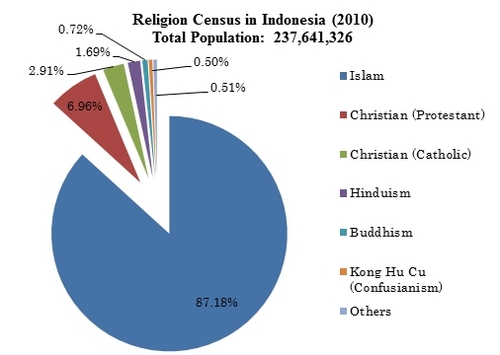
Reference: Statistic Center of Indonesia, "Population by Region and Religion", http://sp2010.bps.go.id/index.php/site/tabel?tid=321&wid=0
Given the fact that Islam is the majority religion in Indonesia and the country has the largest Muslim population, the Islamic value influences very much in many sectors. It is not exception how the society sees the issues of Lesbian, Gay, Bisexual and Transgender (LGBT) community. Up until now, LGBT in Indonesia has been considered as minorities. Some might refer them as marginalized genders. They are often categorized as abnormality, anomaly, or even illness.
The issues of LGBT are varied, such as their identities, what are their origins, at what point is identify decided and if gender is determined at the time of birth, or if LGBT is considered to be the one that was generated by the change of society and culture. In Indonesia, these LGBT issues are not addressed based on the above points. The issue here in Indonesia is how the society sees LGBT. The many of the people in Indonesia see that the LGBT as violating the nature and norm of human being. Therefore the sexual behaviour between persons of the same sex or even the gender reassignment surgery (in case of transgender) is seen as going against religion and God's will. With this in mind, we consider that our readers will have the deep understanding of holding the Discussion Forum under the theme of sexual and gender minorities which is quite sensational and challenging, thus worth having.
Back Issues
- 2024.3. 4 Movie Theaters aroun…
- 2023.4.10 The 49th Japan Found…
- 2023.3.28 JF's Initiatives for…
- 2023.1.27 Living Together with…
- 2022.11.16 Inner Diversity <…
- 2022.6.21 The 48th Japan Found…
- 2022.3.22 JF's Initiatives for…
- 2022.3.14 JF's Initiatives for…
- 2022.2.14 JF's Initiatives for…
- 2022.2. 4 JF's Initiatives for…

